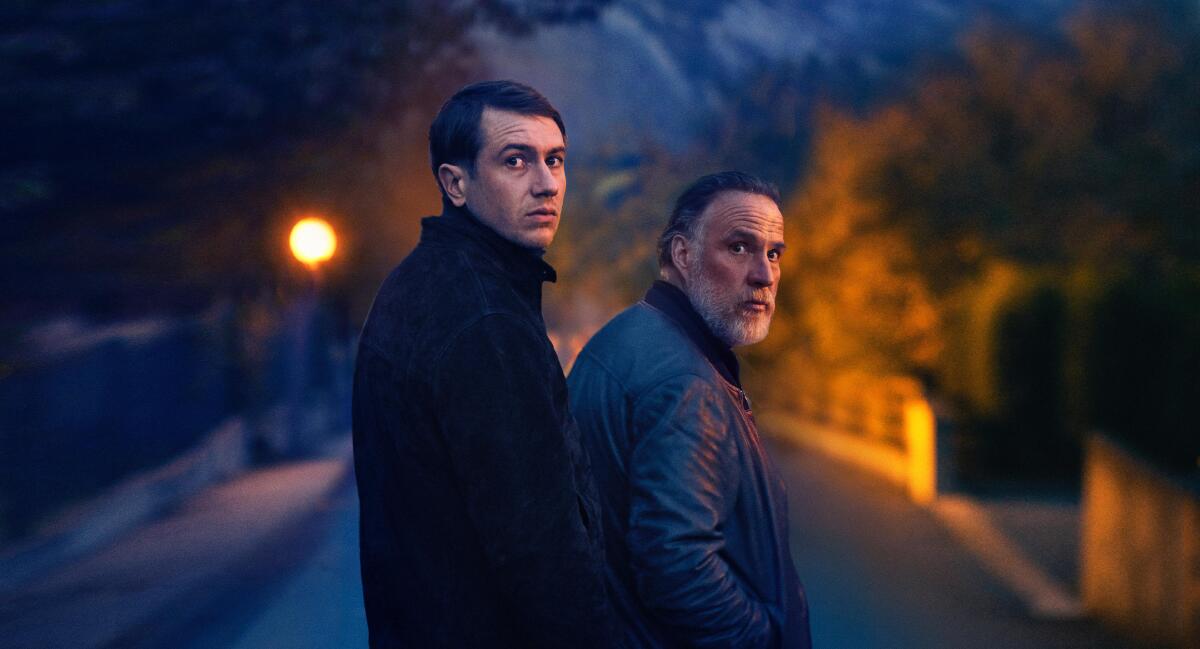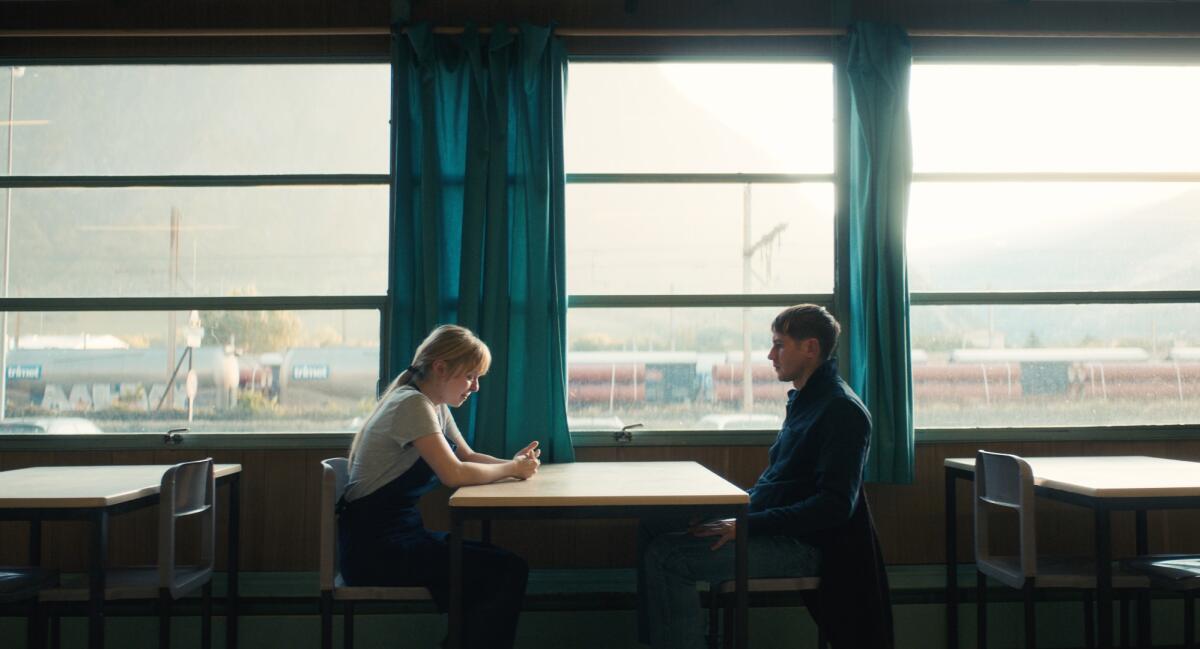The César-winning ‘Night of the 12th’ spins a gripping tale of murder and misogyny

- Share via
The gripping, sobering French procedural “The Night of the 12th” begins with an admission of defeat: The ripped-from-the-headlines homicide case we’re about to observe, it tells us, will remain unsolved. And you desperately want it to be solved, given the particular monstrousness of the crime. In a scenic valley near Grenoble, a 21-year-old woman named Clara (Lula Cotton Frapier) is walking home late one night when a faceless assailant emerges from the shadows, douses her with gasoline and sets her ablaze. It’s a horrifying assault, deeply personal in its brutality — the killer whispers her name beforehand — and it haunts you, much as it haunts the investigators who spend weeks, months and ultimately years trying to earn Clara a measure of justice.
The director Dominik Moll (“With a Friend Like Harry … ,” “Only the Animals”), who wrote the script with his regular collaborator Gilles Marchand, introduces us to those investigators at the outset. Mere hours before the attack, a group of police detectives is celebrating a colleague’s retirement and welcoming his much younger replacement, Yohan (Bastien Bouillon). The scene plays at first like routine exposition; Yohan, the new head of the homicide unit, will be our eyes and ears on the investigation into Clara’s killing. But from the way Moll cuts through the crowd, I think he also means for us to scan the faces of Yohan’s colleagues, to register their boisterous, clubby energy and to notice, crucially but hardly surprisingly, that nearly all of them are men.
The same is true of the various creeps Yohan and his team will interrogate over the course of their long, frustrating investigation into Clara’s death. Nearly all of them were (or claim to have been) romantically involved at one point or another with the deceased, an attractive young woman with a seemingly unquenchable passion for life and love. That’s putting it more politely than some of the men do, whether it’s the former co-worker (Baptiste Perais) who describes Clara as a clingy side-piece or the smug domestic abuser (Pierre Lottin) who claims she liked it rough.
Clara, of course, is unable to defend herself against these characterizations, not all of which come from her potential assailants. “She went for freaks,” one cop says, an instance of slut shaming and victim blaming that inspires a sharp rebuke from Yohan. Played with keen intelligence and compelling restraint by Bouillon, Yohan represents a younger, more enlightened breed of cop: quick to empathize, slow to judge, reluctant to use force unless necessary. His older, more cynical partner, Marceau (Bouli Lanners, excellent), has fewer inhibitions and more paternalistic instincts: Disgusted by the various men he’s interrogating and troubled by personal problems at home, he lashes out with a nothing-to-lose abandon that’s neither defensible nor dismissible.

“The Night of the 12th” (“La nuit du 12”) which swept France’s César Awards this year (it won six prizes, including for best picture and director), is thus both an engrossing detective story and something of an expansive sociological X-ray. Its persuasive, low-key realism has its roots in Pauline Guéna’s 2020 book, “18.3 — Une Année à la PJ,” about a year she spent embedded with criminal investigators in Versailles. But that realism also arises from Moll’s patience as a filmmaker, his desire to capture some of the drudgery and disillusionment of everyday police work and to show the emotional and psychological toll it takes on its most dedicated practitioners.
Working with cinematographer Patrick Ghiringhelli and editor Laurent Rouan, Moll tells the story with atmospheric sweep (the mountainside scenery provides a beautiful, desolate chill) and an unhurried flow. He has a way of infusing even standard procedural tropes — the scouring of the crime scene, the breaking of the news to devastated parents and friends, the endless stakeouts, dead ends and false leads — with an unexpected gravity and emotional power. Even the seasoned crime-fiction aficionado will be reminded here of not just the trauma of murder but also its invasive, disruptive power, the way it brings even tangential secrets into the open and turns the police into professional airers of dirty laundry.
What emerges from this particular case is an expansive study in collective misogyny — the kind of free-floating contempt for women that holds sway over Clara’s small hometown as well as this institution of ostensible law and order. The story’s timing is instructive: Most of it takes place in 2016, shortly before the rise of a #MeToo movement that, in Europe especially, will encounter both resistance and support. But by the time the story concludes three years later, some changes have clearly come to pass: Notably, it’s a female judge (Anouk Grinberg) who urges Yohan to reopen the case in 2019, something he undertakes with crucial assistance from a new colleague, Nadia (Mouna Soualem), one of the few female detectives in the homicide unit.
“Men kill, and the police are men,” Nadia says. “Odd, isn’t it?” It isn’t the only time “The Night of the 12th” spells out its themes and implications with blunt force, something it also does with its recurring shots of Yohan doing laps on his bicycle around a velodrome. If these moments veer toward the obvious, the movie admirably resists a conventional resolution. Its refusal to tie up loose ends has already inspired comparisons to Bong Joon Ho’s “Memories of Murder” and David Fincher’s “Zodiac,” two of modern cinema’s great cold-case classics. Moll’s movie doesn’t leave behind the same deep, implacable chill of those earlier works, but its lingering rage and sorrow are no less easy to wave aside.
‘The Night of the 12th’
Not rated
In French with English subtitles
Running time: 1 hour, 54 minutes
Playing: Starts June 9 at Laemmle Glendale; Laemmle Royal, West Los Angeles; Laemmle Town Center 5, Encino
More to Read
Only good movies
Get the Indie Focus newsletter, Mark Olsen's weekly guide to the world of cinema.
You may occasionally receive promotional content from the Los Angeles Times.









